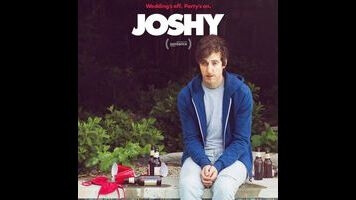Jeff Baena’s Joshy uses so much architecture from indie-movie blueprints and uses so many comic actors as building blocks that it briefly seems like an elaborate spoof project. Tropes like unconventional grieving, romantic bumbling, and a weekend reunion that changes everything could easily be savaged by the likes of Thomas Middleditch, Nick Kroll, Jenny Slate, and Adam Pally. But while it is something of a comedy, Joshy is also serious, and its comic actors follow suit. The title character, played by Middleditch, experiences the abrupt, traumatic end of his engagement in the film’s jarring first sequence, and six months later meets up with his friends Ari (Pally), Adam (Alex Ross Perry), and Eric (Nick Kroll) to convert a planned bachelor party at a rented house into a general guys’ weekend.
This could also be material for a Hangover knockoff, but a melancholic pall hangs over the proceedings. Josh seems to be following a drink-to-forget gameplan, while Eric’s attempts to liven things up have a sweaty desperation even when they’re played for laughs. Adam, a fussy nerd, blanches at some of the drug-fueled debauchery that Eric has in mind, with a distaste that feels lonelier and more awkward than the usual token uptight dude. Ari, meanwhile, fulfills the obligation that at least one bro on a bro weekend must engage in a surprisingly sweet (and easy) flirtation, here with Jodi (Jenny Slate), who he meets at the closest bar.
Hoary tropes of indies and dude-bonding aside, Joshy feels like a labor of love—not least in the favor-calling breadth of the cast, from the recognizable actors who show up for one- to two-scene roles (Alison Brie, Lauren Graham, Jake Johnson, Aubrey Plaza; the lack of Gillian Jacobs, T.J. Miller, and Adam Scott feels downright conspicuous) to the odd litany of other filmmakers in somewhat bigger parts. The latter group includes not just a major role for writer-director Perry (Queen Of Earth, Listen Up Philip) but also appearances from Joe and Kris Swanberg and Paul Weitz. Scarcely a face appears on screen that isn’t recognizable in some way.
The familiarity of the performers is both comforting and a touch incongruous, because the movie itself has the visual drabness of second-tier mumblecore, only occasionally using the camera to convey information about the characters or enhance their conversational jokes. The TV-trained actors provide some polish in a movie that wants to stay a little raw. Much of their dialogue sounds genuinely improvised, but whether it actually comes from Baena’s screenplay or not, it captures many conventions of modern, self-aware conversation: everything from the strange politeness when two people who only know each other tangentially and electronically meet in person (“So funny on the reply-all, man”) to blunt descriptions of close friends (“She’s not that nice but she’s pretty fun”).
Baena’s commitment to a realistic looseness also means that his movie is almost too successful at creating the feeling of hanging out with drunk and/or high people—and that at least a third of Joshy’s scenes run on too long. Some of the movie’s biggest, noisiest confrontations do little to actually push the characters forward in any way, and there are long passages where Middleditch has few scenes or even lines of much consequence, though he is touching in a late-movie breakdown. Some of the marginal characters, like Isadora (Lauren Weedman), an honest and positive-minded sex worker, are drawn with great skill at impressive speed, but the movie discards most of them after a few minutes. The story’s through-line is slender enough that Adam’s weekend-long desire to play an elaborate role-playing game almost qualifies as a full-fledged subplot.
Moment to moment, Joshy is believably amusing and sometimes affecting; no movie that brings in Jenny Slate for self-deprecating rom-com banter can be too punishing to watch. But Joshy never really takes shape, and its shapelessness requires bigger laughs than Baena wants to provide. No one in the movie seems to learn much beyond some rudimentary lessons about the pitfalls of being a drug-addled jerk. Maybe this is a satire after all.


 Keep scrolling for more great stories from A.V. Club.
Keep scrolling for more great stories from A.V. Club.